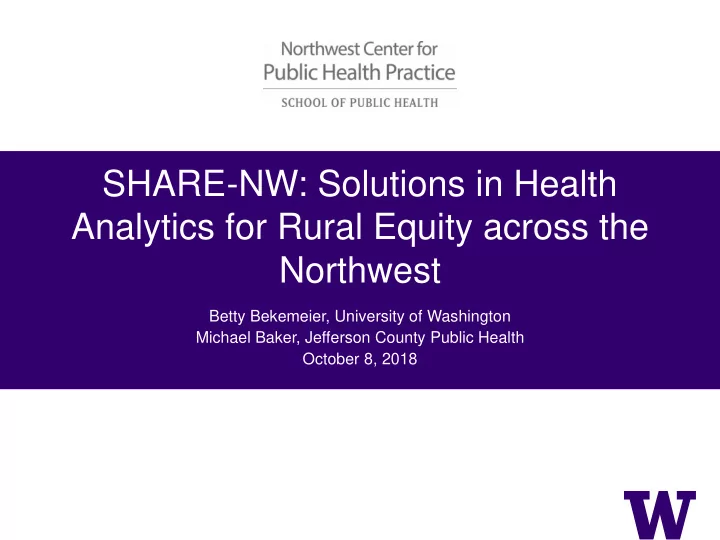

SHARE-NW: Solutions in Health Analytics for Rural Equity across the Northwest Betty Bekemeier, University of Washington Michael Baker, Jefferson County Public Health October 8, 2018
Project Overview • When: 5-year grant, July 1, 2017 - June 30, 2022 • Where: 70 rural health jurisdictions in AK, OR, WA, & ID • How: Training, learning communities, data visualizations, technical assistance
Goals 1. Provide data for decision-making 2. Improve access to data 3. Increase capacity for data use and data-driven decision- making To address health disparities in rural communities
Rural LHDs in OR
What We’ve Done • Identified Partners and Equity Advisory Committee • Evaluation – Identified health disparities and priorities; data sources; gaps in capacity ; and training needs – Assessed capacity for and use of data visualizations – Methods • Key informant interviews • Analysis of CHAs and CHIPs • Training evaluation surveys • Training – Data in decision-making (WA, ID, and OR)
Gaps in Capacity Goal 1 (Year 1) Identify 3-6 of the highest priority gaps in capacity for data- driven decision-making to address SDOH
Methodology 25 Key Informant Interviews • 30-45 minute semi- Interviews per State (n=25) structured telephone interviews Washington 9 • “What are the challenges Idaho or barrier to accessing or 6 using those data sources [you would like greater Oregon 5 access to in order to better understand the health Alaska 5 disparities in your jurisdiction]?”
Limited Access Description Possible Solutions • • Difficult to know where data Create dashboard that are because they are scattered incorporate multiple data in different places sources • Data are not in easily usable formats https://phastdata.org/viz/immunizations
Data are Unavailable Description Possible Solutions • Data don’t exist • Training to collect data • • Units of data are not granular Training to use available data enough to understand creatively communities
Gaps in Capacity: OR • To be useful, data needs to be useable in local programs. • Data that focuses exclusively on community wide issues or are geared toward Community Health Assessment are not Jefferson County, Oregon useable by the majority of public health staff. • Identify ways to incorporate data to improve individual services or programs on a daily basis.
Data Quality Description Possible Solutions • • Data are not accurate or Motivate better data collection reliable through data use • • Data are out of date Training to evaluate data and its utility • Small numbers • Training to evaluate when data are “good enough” • Training about alternative sources of data: e.g. community voices, professional experience, etc.
Limited Capacity for Data Use Description Possible Solutions • • Staff and funding are more Training on how to lead limited in rural areas compared community conversation about to urban areas data • • Limited knowledge, skills, and Training on how to navigate understanding of data and use a data dashboard applicability • Partner with County Health Ranking & Roadmaps (CHRR) coaches
Heterogeneity of Rural Jurisdictions Description Possible Solutions • • Tribal areas are unique Training to compare data with compared to other jurisdictions peers • • Comparisons are difficult Training about alternative because of varying jurisdiction sources of data: e.g. size and characteristics community voices, professional experience, etc.
Address & Identify Health Inequities Description Possible Solutions • • Limited understanding of Training to include equity lens health disparities in their decision-making • Lack of data use to address health disparities
What’s Coming this Year • Collect available data based on needs identified in KIIs • Develop preliminary interactive data dashboard • Identify and curate relevant trainings Focusing on Social determinants of health
Get Involved! We want your input! See sign-up sheet for more information or E-mail phast@uw.edu
Recommend
More recommend